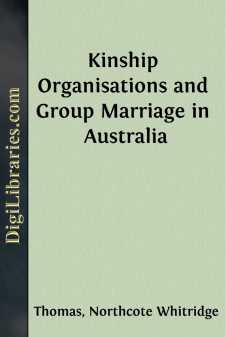Categories
- Antiques & Collectibles 13
- Architecture 36
- Art 48
- Bibles 22
- Biography & Autobiography 813
- Body, Mind & Spirit 142
- Business & Economics 28
- Children's Books 17
- Children's Fiction 14
- Computers 4
- Cooking 94
- Crafts & Hobbies 4
- Drama 346
- Education 46
- Family & Relationships 57
- Fiction 11829
- Games 19
- Gardening 17
- Health & Fitness 34
- History 1377
- House & Home 1
- Humor 147
- Juvenile Fiction 1873
- Juvenile Nonfiction 202
- Language Arts & Disciplines 88
- Law 16
- Literary Collections 686
- Literary Criticism 179
- Mathematics 13
- Medical 41
- Music 40
- Nature 179
- Non-Classifiable 1768
- Performing Arts 7
- Periodicals 1453
- Philosophy 64
- Photography 2
- Poetry 896
- Political Science 203
- Psychology 42
- Reference 154
- Religion 513
- Science 126
- Self-Help 84
- Social Science 81
- Sports & Recreation 34
- Study Aids 3
- Technology & Engineering 59
- Transportation 23
- Travel 463
- True Crime 29
Kinship Organisations and Group Marriage in Australia
Description:
Excerpt
CHAPTER I.
INTRODUCTORY.
Social organisation. Associations in the lower stages of culture. Consanguinity and Kinship. The Tribe. Kinship groups; totem kins; phratries.
The passage from what is commonly termed savagery through barbarism to civilisation is marked by a change in the character of the associations which are almost everywhere a feature of human society. In the lower stages of culture, save among peoples whose organisation has perished under the pressure of foreign invasion or other external influences, man is found grouped into totem kins, intermarrying classes and similar organised bodies, and one of their most important characteristics is that membership of them depends on birth, not on the choice of the individual. In modern society, on the other hand, associations of this sort have entirely disappeared and man is grouped in voluntary societies, membership of which depends on his own choice.
It is true that the family, which exists in the lower stages of culture, though it is overshadowed by the other social phenomena, has persisted through all the manifold revolutions of society; especially in the stage of barbarism, its importance in some directions, such as the regulation of marriage, often forbidden within limits of consanguinity much wider than among ourselves, approaches the influence of the forms of natal association which it had supplanted. In the present day, however, if we set aside its economic and steadily diminishing ethical sides, it cannot be compared in importance with the territorial groupings on which state and municipal activities depend.
If the family is a persistent type the tribe may also be compared to the modern state; it is, in most parts of the world, no less territorial in its nature; membership of it does not depend among the Australians on any supposed descent from a common ancestor; and though residence plus possession of a common speech is mentioned by Howitt as the test of tribe, it is possible in Australia, under certain conditions, to pass from one tribe to another in such a way that we seem reduced to residence as the test of membership. This change of tribe takes place almost exclusively where tribes are friendly, so far as is known; and we may doubt whether it would be possible for a stranger to settle, without any rite of adoption, in the midst of a hostile or even of an unknown tribe; but this is clearly a matter of minor importance, if adoption is not, as in North America, an invariable element of the change of tribe. Although membership of a tribe is thus loosely determined, tribesmen feel themselves bound by ties of some kind to their fellow-tribesmen, as we shall see below, but in this they do not differ from the members of any modern state.
But in Australia the importance of the tribe, save from an economic point of view, as joint owner of the tribal land, is small compared with the part played in the lives of its members by the intratribal associations, whose influence is recognised without, as within the tribe. These associations are of two kinds in the lowest strata of human society; in each case membership is determined by birth and they may therefore be distinguished as natal associations. In the one case, the kinship groups such as totem kins, phratries, etc., an individual remains permanently in the association into which he is born, special cases apart, in which by adoption he passes out of it and joins another by means of a legal fiction. The other kind of association, to which the name age-grades is applied, is composed of a series of grades, through which, concomitantly with the performance of the rites of initiation obligatory on every male member of the community, each man passes in succession, until he attains the highest. In the rare cases where an individual fails to qualify for the grade into which his coevals pass, and remains in the grade of "youth" or even lower grades, he is by birth a member of one class and does not remain outside the age-grades altogether.
In the element of voluntary action lies the distinction between age-grades and secret societies, which are organised on identical or similar lines but depend for membership on ceremonies of initiation, alike in the lowest as in the highest grade. Such societies may be termed voluntary. The differentia between the natal and the voluntary association lies in the fact that in the former all are members of one or other grade, in the latter only such as have taken steps to gain admission, all others being simply non-members....


